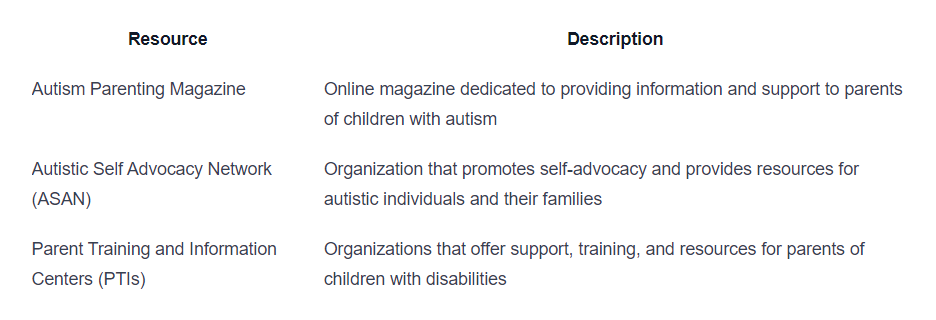Can Autistic People Have Kids?
Breaking stereotypes: Can autistic individuals have kids? Debunking myths and embracing parenthood with autism.

Parenthood and Autism
When it comes to the topic of parenthood and autism, there may be misconceptions and stereotypes that need to be addressed. In this section, we will explore the question of whether autistic individuals can have children and gain a better understanding of the intersection of autism and parenthood.

Breaking Stereotypes: Can Autistic Individuals Have Kids?
Contrary to common misconceptions, autistic individuals are fully capable of having children. Autism is a neurodevelopmental condition that affects social interaction, communication, and behavior. However, it does not inherently prevent individuals from forming meaningful relationships or becoming parents.
Parenthood is a deeply personal decision that is influenced by various factors, including an individual's personal desires, circumstances, and support systems. Autistic individuals, like anyone else, have the capacity to experience love, develop relationships, and build families.
It is important to recognize that each autistic individual is unique, and their experiences with parenthood will vary. Some autistic individuals may face challenges related to parenting, while others may thrive in their role as parents. It is crucial to approach the topic of parenthood and autism with an understanding that neurodiversity exists within the realm of parenting as well.
Understanding Autism and Parenthood
Autism can bring both unique strengths and challenges to the journey of parenthood. While autistic individuals may face certain difficulties associated with their condition, they also possess various strengths that can positively contribute to their role as parents.
Autistic individuals often exhibit attention to detail, honesty, and a deep level of dedication to their interests. These qualities can translate into being highly engaged and attentive parents. Additionally, their unique perspectives and approaches can foster a nurturing and inclusive environment for their children.
It is important to note that just as there is a wide range of parenting styles and approaches among neurotypical individuals, the same applies to autistic individuals. Each parent, regardless of their neurodivergent status, will have their own parenting style influenced by their values, experiences, and unique circumstances.
Understanding and supporting autistic individuals in their journey of parenthood involves acknowledging their strengths, addressing their challenges, and providing them with the necessary resources and support. By promoting acceptance and inclusivity, we can create a society that supports all individuals, including autistic parents, in their pursuit of fulfilling and rewarding parenting experiences.
Debunking Myths
Misconceptions and stereotypes about autism can lead to misunderstandings and biases, particularly when it comes to parenthood. Let's debunk some common myths surrounding autistic individuals and their ability to be parents.
Myth: Autistic Individuals Lack Empathy
One prevailing myth is that autistic individuals lack empathy. However, this is far from the truth. Autism does not imply a lack of empathy; rather, autistic individuals may experience and express empathy differently. Research has shown that autistic individuals can have deep emotional connections and understand the emotions of others, although their way of expressing empathy may be unique.
Myth: Autistic Individuals Cannot Form Attachments
Another misconception is that autistic individuals are unable to form attachments with their children or other family members. The reality is that autistic individuals are fully capable of forming strong and loving attachments. While the style of attachment may differ from neurotypical parents, autistic parents can develop deep bonds with their children through their own unique ways of connecting and nurturing.
Myth: Autistic Individuals Are Unable to Provide Care
It is often assumed that autistic individuals are incapable of providing adequate care for their children. However, this is a misguided belief. Autistic individuals can be excellent caregivers, providing love, support, and meeting the needs of their children. They may have different approaches and strategies, tailored to their individual strengths and challenges. With the right support and understanding, autistic parents can successfully navigate the responsibilities of caregiving.
To dispel these myths, it is important to recognize that autism is a spectrum, and individuals with autism have diverse experiences and capabilities. By challenging preconceived notions and promoting understanding, we can create a more inclusive society that acknowledges the parenting abilities of autistic individuals.
Challenges and Considerations
Parenthood can present unique challenges for individuals on the autism spectrum. However, with the right support and strategies in place, many autistic individuals can thrive as parents. Here are some important challenges and considerations to keep in mind:
Unique Parenting Styles and Approaches
Autistic individuals may have different parenting styles and approaches compared to neurotypical parents. They often prioritize structure, routine, and clear communication to create a stable and predictable environment for their children. This can provide a sense of security and help children with autism thrive.
Autistic parents may be more attuned to sensory sensitivities and work to create a home environment that minimizes overwhelming stimuli. They may also be more understanding of their child's need for alone time or specific coping strategies.
In terms of communication, autistic parents may be more direct and explicit in their explanations and instructions. They may break down tasks into smaller, more manageable steps and use visual aids to support understanding. This clear, straightforward communication style can be beneficial for all children, not just those on the autism spectrum.
Autistic parents may also be strong advocates for their children, especially in educational and medical settings. They may be more willing to challenge traditional approaches and push for accommodations that meet their child's unique needs.
It's important to recognize and respect these unique parenting styles. Each individual brings their own strengths and perspectives, which can benefit their children in various ways. Autistic parents may be more empathetic to their child's struggles and be better equipped to provide the specific support they need.
By embracing their own parenting style, autistic parents can create a nurturing and supportive environment for their children. They can draw on their own experiences and insights to help their children navigate challenges and celebrate their successes.
Ultimately, there is no one "right" way to parent, and autistic parents demonstrate that diverse approaches can lead to positive outcomes. By valuing and learning from these unique perspectives, we can create a more inclusive and understanding society for all families.
Sensory Considerations and Parenting Strategies
Sensory sensitivities are common among individuals on the autism spectrum. As parents, it's important to consider how sensory experiences can impact both themselves and their children. Bright lights, loud noises, or certain textures might be overwhelming for some individuals with autism.
To address sensory challenges, parents can implement strategies such as creating calm and quiet spaces at home, using visual schedules or timers to provide predictability, and using sensory tools like weighted blankets or fidget toys to help regulate sensory input. By being mindful of sensory needs and making necessary adaptations, autistic parents can create a more comfortable and supportive environment for themselves and their children.
Seeking Support and Resources
Parenting can be demanding, and seeking support is crucial for all parents, including those on the autism spectrum. Autistic individuals can benefit from connecting with support groups, online communities, or seeking guidance from professionals who specialize in autism and parenting.
There are various resources available to assist autistic parents in navigating the challenges they may face. These resources can provide information, guidance, and emotional support. Additionally, seeking support from family, friends, and healthcare professionals can also be invaluable.

By seeking support and utilizing available resources, autistic parents can enhance their parenting journey and find the assistance they need to navigate any challenges that arise.
Navigating the challenges of parenting as an autistic individual requires understanding, acceptance, and access to support. By recognizing and addressing unique parenting styles and approaches, considering sensory needs, and seeking support and resources, autistic individuals can embrace parenthood and provide a nurturing environment for their children.
Thriving as an Autistic Parent
Parenting is a journey that presents unique challenges and joys for individuals on the autism spectrum. While the path may be different from that of neurotypical parents, autistic parents possess inherent strengths and abilities that can help them navigate the complexities of raising a child. With the right support, strategies, and mindset, autistic parents can not only succeed but also thrive in their role as caregivers, nurturers, and guides for their children.
In this section, we will explore three essential aspects of thriving as an autistic parent: advocacy and self-advocacy, building a supportive network, and celebrating neurodiversity in parenthood. By focusing on these key areas, autistic parents can cultivate a sense of empowerment, resilience, and fulfillment in their parenting journey.
Advocacy and self-advocacy play a crucial role in ensuring that autistic parents receive the accommodations, resources, and understanding they need to effectively care for their children and maintain their own well-being. It is essential for autistic parents to learn how to communicate their needs, assert their rights, and educate others about autism and neurodiversity. By becoming strong advocates for themselves and their families, autistic parents can break down barriers, challenge misconceptions, and create a more inclusive and supportive environment for their children to grow and thrive.
Building a supportive network is another critical component of thriving as an autistic parent. Parenting can be an isolating experience, especially for those who may struggle with social interactions or sensory overload. However, by connecting with other autistic parents, joining support groups, and seeking out understanding professionals, autistic parents can find a sense of community, validation, and practical guidance. A strong support system can provide a safe space to share experiences, learn from others, and find encouragement during challenging times.
Finally, celebrating neurodiversity in parenthood is a powerful way for autistic parents to embrace their unique strengths and create a positive narrative around autism and parenting. By recognizing and valuing the diverse ways in which autistic parents approach child-rearing, problem-solving, and emotional connection, we can challenge the notion that there is only one "right" way to be a parent. Autistic parents bring a wealth of creativity, empathy, and insight to their roles, and by celebrating these qualities, we can foster a more accepting and inclusive society for all families.
Thriving as an autistic parent is not about trying to fit into a neurotypical mold or striving for perfection. Instead, it is about embracing the unique journey of parenting as an autistic individual, finding strength in self-advocacy, building a supportive network, and celebrating the beauty of neurodiversity in parenthood. By doing so, autistic parents can create a fulfilling and nurturing environment for themselves and their children, one that honors their authentic selves and allows them to flourish.
Advocacy and Self-Advocacy
Advocacy and self-advocacy are crucial for autistic parents to ensure their needs and those of their children are met. By advocating for themselves and their children, autistic parents can create an inclusive and understanding environment. Self-advocacy involves recognizing and communicating personal boundaries, needs, and preferences to others involved in the parenting journey.
Advocacy and Self-Advocacy Strategies
Educate yourself about autism and how it may impact your parenting experience.
Communicate openly with healthcare professionals, educators, and other support systems.
Seek accommodations or modifications, if necessary, to ensure a positive parenting experience.
Connect with autism advocacy organizations for guidance and resources.
Building a Supportive Network
Building a strong support network is vital for all parents, including those on the autism spectrum. Having a network of understanding friends, family members, and professionals can provide emotional support, guidance, and practical assistance. These individuals can offer a listening ear, share parenting tips, and help navigate the challenges that may arise.
Support Network Building Strategies
Seek out local or online support groups specifically for autistic parents.
Connect with other parents who have similar experiences and challenges.
Communicate openly with your partner or co-parent about your needs and concerns.
Engage with professionals, such as therapists or counselors, who can provide guidance and support.
Celebrating Neurodiversity in Parenthood
Neurodiversity is the understanding that neurological differences, including autism, are natural variations of the human brain. As an autistic parent, embracing neurodiversity allows you to celebrate your unique strengths and perspectives, fostering a positive environment for both yourself and your children.
Celebrating Neurodiversity in Parenthood
Focus on your strengths and abilities as a parent.
Encourage open and honest communication within your family.
Embrace different ways of learning and problem-solving.
Teach your children about autism and neurodiversity, promoting acceptance and understanding.
By practicing advocacy and self-advocacy, building a supportive network, and celebrating neurodiversity, autistic parents can thrive in their parenting journey. Remember that every individual and family is unique, so finding what works best for you and your children is key. Embrace your strengths, seek support when needed, and celebrate the joy that parenthood brings.
Sources
https://www.crossrivertherapy.com/autism/can-autistic-people-have-kids
https://www.abtaba.com/blog/autistic-people-have-kids
https://www.thetreetop.com/aba-therapy/can-autistic-people-have-kids
Similar articles
We’re here to help you

Our team is here to assist you in this process. Contact us for any assistance.
it’s easy to apply
We Accept Most Insurances
Our in-network insurance partnerships make ABA therapy more accessible to families throughout our service areas.







Our Insurance Process
We'll request your insurance details to help us verify your plan's coverage for ABA therapy. Once we've received this information, we'll walk you through your benefits, including copayments, deductibles and out-of-pocket maximums, so you know what to expect in advance.
Our team will then handle the preauthorization and all the necessary paperwork.
.svg)





















.jpeg)


































.jpeg)




.jpeg)







.jpeg)











.jpeg)
















